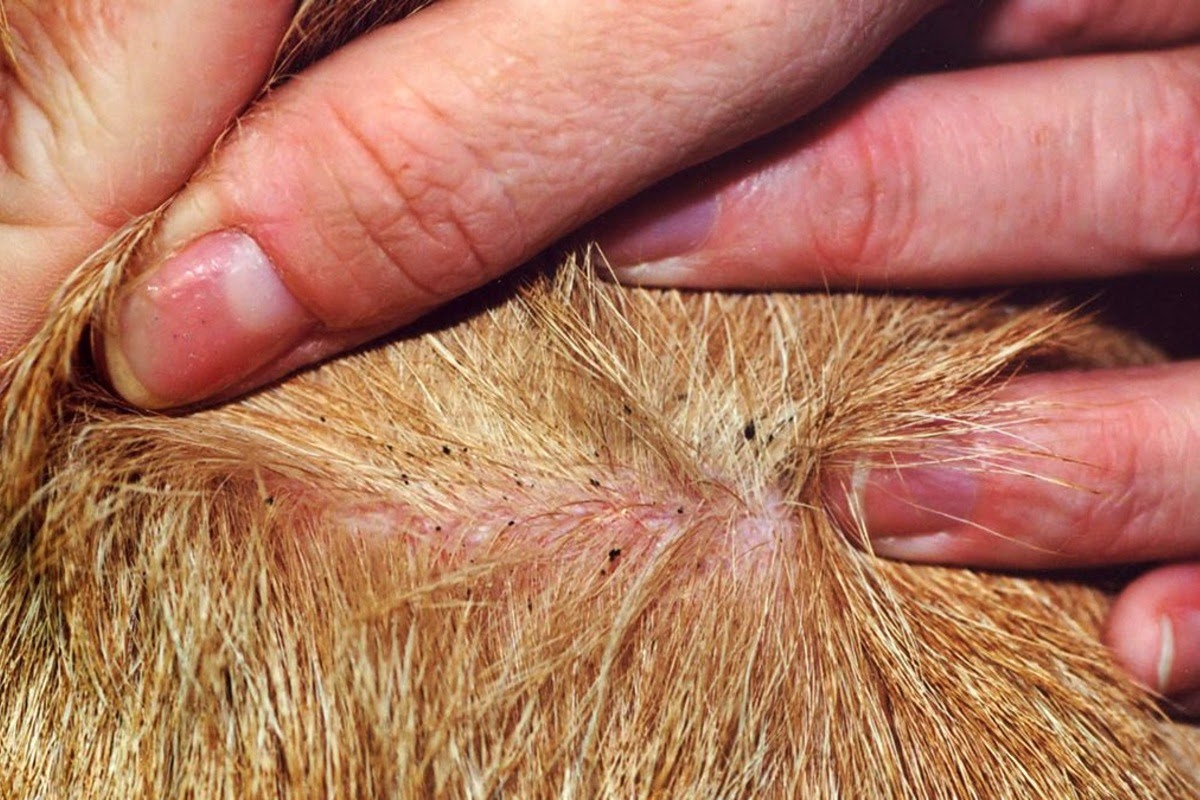Home>Health & Wellness>Common Health Issues>Why Are Bernese Mountain Dogs Prone To Cancer?


Common Health Issues
Why Are Bernese Mountain Dogs Prone To Cancer?
Published: February 5, 2024
Learn why Bernese Mountain Dogs are prone to cancer and other common health issues affecting this breed. Understand how to care for your pet's health.
(Many of the links in this article redirect to a specific reviewed product. Your purchase of these products through affiliate links helps to generate commission for Pawsomeoldies.com, at no extra cost. Learn more)
Table of Contents
Introduction
Bernese Mountain Dogs are beloved for their gentle nature, striking appearance, and unwavering loyalty. However, despite their endearing qualities, these majestic canines are unfortunately prone to certain health issues, with cancer being a significant concern. Understanding the factors that contribute to this susceptibility is crucial for both current and prospective Bernese Mountain Dog owners.
This article delves into the various reasons why Bernese Mountain Dogs are predisposed to cancer, shedding light on genetic predisposition, their large size and rapid growth, as well as environmental factors that play a role in their susceptibility to this disease. Additionally, we will explore the common types of cancer that affect this breed and provide insights into prevention and early detection strategies.
By gaining a deeper understanding of the unique health challenges faced by Bernese Mountain Dogs, we can equip ourselves with the knowledge needed to provide them with the best possible care and support. Let's embark on this journey to unravel the complexities surrounding cancer in Bernese Mountain Dogs and discover how we can make a positive impact on their well-being.
Read more: Why Do Most Dogs Die Of Cancer
Genetic predisposition to cancer
Bernese Mountain Dogs are known for their susceptibility to certain types of cancer, and this vulnerability is closely linked to their genetic makeup. While these dogs boast a striking appearance and gentle demeanor, their genetic predisposition to cancer is a significant concern for owners and breeders alike.
One of the primary factors contributing to the heightened cancer risk in Bernese Mountain Dogs is their genetic predisposition. Studies have revealed that this breed is more prone to specific types of cancer compared to other breeds. The most prevalent types of cancer in Bernese Mountain Dogs include mast cell tumors, histiocytic sarcoma, and lymphoma. These conditions are often attributed to genetic mutations that increase the likelihood of cancer development.
Furthermore, the breed's genetic predisposition to cancer is associated with inherited traits that influence their susceptibility to the disease. For instance, Bernese Mountain Dogs are more likely to carry genetic markers that predispose them to certain types of cancer, making it crucial for breeders to carefully select mating pairs to minimize the transmission of these genetic predispositions.
Understanding the genetic underpinnings of cancer susceptibility in Bernese Mountain Dogs is essential for implementing proactive measures to mitigate the risk. By identifying specific genetic markers associated with cancer predisposition, veterinarians and researchers can develop targeted screening protocols and genetic testing to identify at-risk individuals early on.
Moreover, ongoing research into the genetic factors contributing to cancer susceptibility in Bernese Mountain Dogs holds promise for the development of tailored treatment approaches. By unraveling the intricate genetic landscape of this breed, veterinary professionals can explore innovative therapeutic interventions that address the unique genetic predispositions of Bernese Mountain Dogs, ultimately improving their quality of life and prognosis.
In essence, the genetic predisposition to cancer in Bernese Mountain Dogs underscores the importance of genetic screening, responsible breeding practices, and ongoing research initiatives aimed at unraveling the complexities of cancer susceptibility in this beloved breed. By delving into the genetic underpinnings of cancer predisposition, we can pave the way for advancements in early detection, targeted treatment, and ultimately, a brighter future for Bernese Mountain Dogs facing this formidable health challenge.
Large size and rapid growth
The substantial stature and rapid growth exhibited by Bernese Mountain Dogs are defining characteristics of this beloved breed. However, these attributes, while contributing to their impressive physical presence, also play a role in their susceptibility to certain health issues, including cancer.
The large size of Bernese Mountain Dogs, coupled with their rapid growth during puppyhood, presents unique challenges in terms of cancer risk. The accelerated growth rate experienced by these dogs places additional strain on their developing bodies, potentially impacting their cellular health and increasing the likelihood of abnormal cell growth, a hallmark of cancer development.
Furthermore, the sheer size of Bernese Mountain Dogs necessitates robust physiological processes to support their expansive frames. This heightened metabolic demand, coupled with the intricacies of regulating cellular division and growth in large breeds, creates an environment where abnormalities in cell replication and DNA repair mechanisms can potentially lead to cancerous growths.
The rapid growth phase experienced by Bernese Mountain Dogs during puppyhood is a critical period that can influence their long-term health outcomes. This accelerated growth trajectory, if not carefully managed, can potentially disrupt the delicate balance of cellular proliferation and differentiation, increasing the risk of tumorigenesis.
Moreover, the interplay between large size, rapid growth, and cancer susceptibility in Bernese Mountain Dogs underscores the importance of tailored nutritional and growth management strategies. By implementing controlled growth protocols and ensuring optimal nutrition during the formative stages of their development, owners and breeders can mitigate the potential impact of rapid growth on cancer risk.
In essence, the large size and rapid growth exhibited by Bernese Mountain Dogs are integral components of their unique physiology, yet they also contribute to their susceptibility to certain health challenges, including cancer. By recognizing the intricate relationship between size, growth rate, and cancer risk in this breed, we can implement proactive measures to support their overall well-being and mitigate the impact of these factors on their health outcomes.
Environmental factors
In addition to genetic predisposition and physiological characteristics, environmental factors play a pivotal role in influencing the susceptibility of Bernese Mountain Dogs to cancer. These factors encompass a wide array of elements within the canine's living environment, ranging from exposure to carcinogens to lifestyle influences that can impact their overall health.
One significant environmental factor that can contribute to cancer risk in Bernese Mountain Dogs is exposure to environmental toxins and carcinogens. These can include pollutants in the air, water, or soil, as well as substances encountered in everyday surroundings. Prolonged exposure to these harmful agents can potentially disrupt cellular function and DNA integrity, increasing the likelihood of cancer development in susceptible individuals.
Furthermore, lifestyle factors such as diet, exercise, and stress levels can also influence the cancer risk in Bernese Mountain Dogs. A balanced and nutritious diet plays a crucial role in supporting the overall health and immune function of these dogs, potentially reducing the risk of cancer development. Conversely, a sedentary lifestyle and high levels of stress can compromise their immune system and overall well-being, potentially impacting their susceptibility to cancer.
Moreover, the impact of environmental factors on cancer risk extends to the realm of preventive healthcare. Regular veterinary check-ups, vaccinations, and preventive screenings are essential components of proactive cancer management. By staying attuned to the environmental influences that can impact their health, owners and caregivers can take proactive steps to minimize potential risk factors and optimize the well-being of their beloved Bernese Mountain Dogs.
In essence, environmental factors encompass a broad spectrum of influences that can impact the cancer risk in Bernese Mountain Dogs. By recognizing the multifaceted nature of these environmental influences, we can implement proactive measures to create a supportive and nurturing living environment for these magnificent canines, ultimately contributing to their long-term health and well-being.
Common types of cancer in Bernese Mountain Dogs
Bernese Mountain Dogs are unfortunately predisposed to several types of cancer, with certain malignancies being more prevalent within this breed compared to others. Understanding these common types of cancer is crucial for early detection, timely intervention, and proactive management of the disease.
-
Mast Cell Tumors: Among the most frequently encountered cancers in Bernese Mountain Dogs, mast cell tumors arise from a type of white blood cell and can manifest in various locations on the body. These tumors can vary in severity, with some being benign while others exhibit aggressive behavior, necessitating prompt medical attention.
-
Histiocytic Sarcoma: This aggressive and often devastating cancer primarily affects the cells of the immune system. Bernese Mountain Dogs are particularly susceptible to histiocytic sarcoma, which commonly presents as tumors in the spleen, lungs, or other vital organs. Early detection and comprehensive treatment are essential in managing this formidable malignancy.
-
Lymphoma: Lymphoma, a cancer of the lymphatic system, is another prevalent concern in Bernese Mountain Dogs. This condition can manifest in various forms, impacting the lymph nodes, spleen, and other lymphoid tissues. Given the breed's predisposition to lymphoma, vigilant monitoring and proactive screening are imperative for timely diagnosis and intervention.
Understanding the prevalence of these specific types of cancer in Bernese Mountain Dogs underscores the importance of regular veterinary check-ups, comprehensive screenings, and proactive health management. By staying informed about the common malignancies affecting this breed, owners and caregivers can remain vigilant and proactive in safeguarding the well-being of their beloved companions.
In essence, the prevalence of mast cell tumors, histiocytic sarcoma, and lymphoma in Bernese Mountain Dogs highlights the significance of early detection, comprehensive screenings, and proactive health management. By gaining insights into these common types of cancer, we can equip ourselves with the knowledge needed to provide the best possible care and support for these remarkable canines.
Read more: Why Would A Dog Get Liver Cancer
Prevention and early detection strategies
Preventing and detecting cancer in Bernese Mountain Dogs necessitates a multifaceted approach that encompasses proactive measures, vigilant monitoring, and comprehensive screenings. By implementing targeted strategies aimed at mitigating risk factors and facilitating early detection, owners and caregivers can significantly impact the well-being of these beloved canines.
Nutritional and lifestyle considerations
A balanced and nutritious diet plays a pivotal role in supporting the overall health and immune function of Bernese Mountain Dogs. Opting for high-quality, well-balanced dog food that meets their specific nutritional needs can contribute to their overall well-being and potentially reduce the risk of cancer development. Additionally, maintaining a healthy weight through regular exercise and providing ample opportunities for physical activity can further support their immune system and overall health.
Regular veterinary check-ups and screenings
Routine veterinary check-ups are essential for proactive cancer management. These visits provide opportunities for comprehensive physical examinations, allowing veterinarians to assess the overall health of Bernese Mountain Dogs and detect any potential abnormalities. Furthermore, proactive screenings, including blood tests, imaging studies, and specific cancer screenings, can aid in early detection, enabling timely intervention and treatment if cancer is suspected.
Environmental risk assessment and management
Assessing the living environment of Bernese Mountain Dogs is crucial for identifying and mitigating potential risk factors. Minimizing exposure to environmental toxins and carcinogens, ensuring a clean and safe living space, and implementing preventive measures to reduce the impact of environmental factors can contribute to their overall well-being and potentially lower the risk of cancer development.
Read more: Why Hypercalcemia Indicates Cancer In Dogs
Genetic testing and breeding considerations
Genetic testing can provide valuable insights into the predisposition of Bernese Mountain Dogs to certain types of cancer. By leveraging genetic screening protocols, breeders and owners can make informed decisions regarding breeding practices, aiming to minimize the transmission of genetic predispositions to cancer. Responsible breeding practices that prioritize the health and genetic diversity of the breed can play a pivotal role in mitigating the impact of genetic predisposition to cancer.
Education and awareness
Equipping owners and caregivers with knowledge about the common types of cancer in Bernese Mountain Dogs, early warning signs, and proactive health management strategies is essential. By fostering awareness and understanding within the community, individuals can become proactive advocates for the well-being of these remarkable canines, contributing to a supportive and informed network dedicated to cancer prevention and early detection.
In essence, the implementation of comprehensive prevention and early detection strategies is paramount in safeguarding the health and well-being of Bernese Mountain Dogs. By embracing a proactive and holistic approach that encompasses nutritional considerations, regular veterinary care, environmental risk management, genetic testing, and education, owners and caregivers can make a meaningful impact in mitigating cancer risk and promoting the long-term health of these cherished companions.
Conclusion
In conclusion, the susceptibility of Bernese Mountain Dogs to cancer is a multifaceted issue influenced by genetic predisposition, physiological characteristics, and environmental factors. The intricate interplay of these elements underscores the importance of a comprehensive and proactive approach to cancer management in this beloved breed.
Understanding the genetic underpinnings of cancer predisposition in Bernese Mountain Dogs is pivotal for implementing targeted screening protocols, genetic testing, and responsible breeding practices. By leveraging insights into the breed's genetic predisposition to certain types of cancer, veterinarians and researchers can pave the way for tailored treatment approaches and advancements in early detection, ultimately improving the prognosis and quality of life for affected individuals.
The large size and rapid growth experienced by Bernese Mountain Dogs present unique challenges in terms of cancer risk. By recognizing the impact of accelerated growth on cellular health and DNA integrity, owners and breeders can implement controlled growth protocols and optimal nutrition strategies to mitigate potential risk factors and support the long-term well-being of these majestic canines.
Environmental factors, encompassing exposure to toxins, lifestyle influences, and preventive healthcare, play a pivotal role in influencing the cancer risk in Bernese Mountain Dogs. By creating a nurturing living environment, staying attuned to potential risk factors, and embracing proactive healthcare measures, owners and caregivers can contribute to the overall health and resilience of their beloved companions.
Moreover, the prevalence of specific types of cancer, such as mast cell tumors, histiocytic sarcoma, and lymphoma, underscores the importance of regular veterinary check-ups, comprehensive screenings, and proactive health management. By gaining insights into these common malignancies, owners and caregivers can remain vigilant and proactive in safeguarding the well-being of their cherished Bernese Mountain Dogs.
The implementation of comprehensive prevention and early detection strategies, encompassing nutritional considerations, regular veterinary care, environmental risk management, genetic testing, and education, is paramount in mitigating cancer risk and promoting the long-term health of Bernese Mountain Dogs. By embracing a proactive and holistic approach, individuals can make a meaningful impact in supporting the well-being of these remarkable canines.
In essence, by delving into the complexities surrounding cancer in Bernese Mountain Dogs and embracing proactive measures, we can equip ourselves with the knowledge and tools needed to provide the best possible care and support for these beloved companions, ultimately contributing to their long-term health and well-being.













